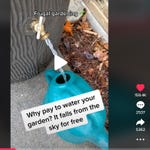The Truth about Rain Barrels
Find out if rain barrels are illegal in your state with this short guide. We discuss local regulations and the surprising history behind water rights in the United States.
Legality remains the most common misconception about rain barrels. When our recent TikTok video went viral, several commenters asked the same question. Are rain barrels illegal? Others wanted to know more about the subject. Where do you buy rain barrels? What do you do to prevent overflows? In response, we wrote an article all about rain barrels.

Rain Barrels on TikTok
Are rain barrels illegal?
While some states have restrictions on collecting rain water, no law exists to prevent the sale or use of rain barrels in the United States. In fact, many states encourage the practice. Check out The Office of Energy Efficiency and Renewable Energy, a US government agency, for an interactive map. It shows a state-by-state breakdown of regulations on rainwater collection.

Most restrictions deal with safety and the common good. For example, if you collect rainwater, don't drink it. It's not potable. Instead, use the water for your flower beds.
Safe uses for rainwater:
- Water flower beds
- Wash your car
- Refill a birdbath
- Fill decorative fountains
How did that rumor get started?
It might seem like a myth, but one state criminalized rainwater collection for years. Colorado still has aggressive water-rights rules, and it was illegal to use a rain barrel in that state until relatively recently. Only in 2016 did things change. That's when lawmakers passed Law HB-1005. The law allows single-family and smaller multi-family homes to collect up to 110 gallons of rainwater with rain barrels.
Most other states encourage rainwater collection. Especially in states with water shortages, residents who collect rainwater put less of a strain on public water sources when they use their own harvested water for gardening.
So, is it illegal to collect rainwater? Not usually. No!





